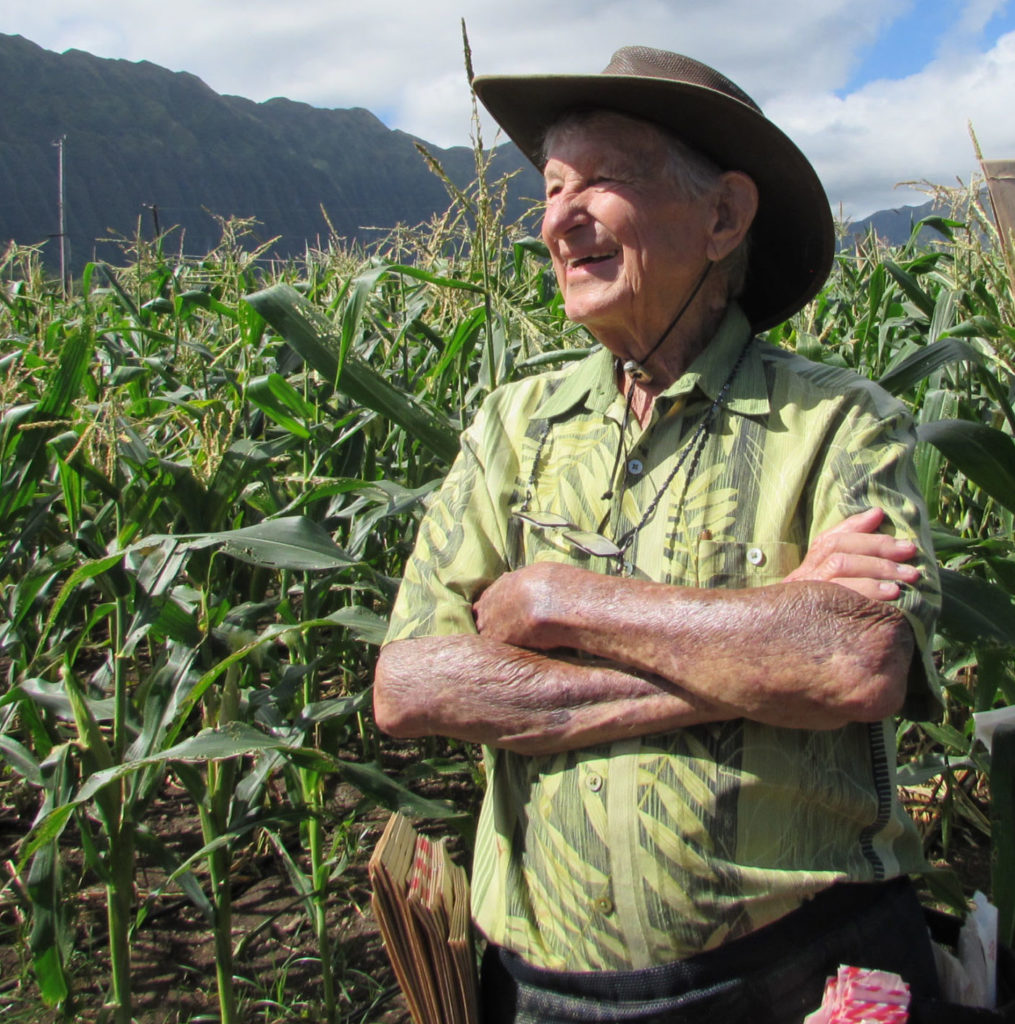The Legacy of James Brewbaker
In today’s world of bistros and gastropubs, the biggest decision a diner might face is what tapas to order next. However, in other parts of the world the decision is unfortunately much simpler—food or no food. This option never sat well for horticulturalist and crop geneticist Dr. James Brewbaker, who retired in 2015 from the College of Tropical Agriculture and Human Resources (CTAHR) at the University of Hawai‘i at Mānoa (UH Mānoa) after a stellar 63-year career—54 of them at UH.
“As a typical plant breeder, I’m always optimistic about the future but pragmatic about what has been achieved,” said Brewbaker, emeritus professor in CTAHR’s Department of Tropical Plant and Soil Sciences. “It’s never quite enough in a world of seven billion where two billion are hungry.”

UH’s Waimanalo Research Station
It was at an early age that Brewbaker recognized the potential for feeding the large and undernourished populations of the world with corn from his father Dr. Harvey Brewbaker, a noted sugar beet breeder and seedsman, who had a deep interest in early American civilizations and their dependence on corn as the most important food source. Later, Brewbaker would continue his father’s interest with his own significant publication in 1979 that detailed the role of corn diseases in the collapses of the Maya, Anasazi and Teotihuacan civilizations a millennium ago.
Over the years, Brewbaker’s growing interest and passion in crop development brought him to the University of Colorado for his BS, to Cornell University for his PhD, and later to the California Institute of Technology, where he worked in the team under Nobel laureate geneticist George Beadle. Later he conducted postdoctoral studies in Sweden and then at the University of the Philippines in Los Baños, where he joined a team proved that corn could be grown at least three times a year in single tropical fields—as opposed to the single crop in temperate climates. He also became familiar with tropical legume trees like Hawai‘i’s koa and koa haole that could provide valuable fixed nitrogen for hungry crops like corn.
In 1961, Brewbaker packed up his family of four and left for Hawai‘i to join UH Mānoa’s Department of Horticulture (as it was known prior to CTAHR), who sought out his expertise to aid local corn farmers seeking a solution to a maize mosaic disease that had wiped out O‘ahu’s sweet corn production. Operating largely out of the university’s Waimanalo Research Station, a place that became his favorite working office for the next 54 years, Brewbaker’s team developed disease resistant and commercially viable varieties. Among these, “Hawaiian Supersweet #9,” went worldwide and now undergirds vegetable corn industries in countries such as Thailand—the world’s largest producer of canned corn. Today, many of Brewbaker’s hybrids can be found across Hawai‘i and internationally, including the well-known “Kahuku Sweet Corn,” all of them noted for resistance to often-unique tropical diseases and insects. His Waimanalo fields were maintained for more than 50 years without pesticides other than for weed control.
While away from his Waimanalo research field, Brewbaker managed to find time to create Hawai‘i Foundation Seeds in 1977, a UH-sponsored organization which manages collections of parent seed stocks for research and commercial use, as well as providing seed samples and education to the community. He was also instrumental in founding the Hawai‘i Crop Improvement Association in 1970 to assist the seed industry that accounts for one-third of the state’s agricultural industry.
Brewbaker has received numerous awards and accolades from major plant breeding organizations, including the 2013 Crop Science Society of America Presidential Award that recognized his outstanding contributions to crop science through education, national and international service, and research. A prolific writer, he has authored more than 280 publications, including Agricultural Genetics, which was translated into seven languages. Many of these reflect the research of his 52 “wonderful” grad students, half of them having completed PhDs in corn or tree breeding. “Plant breeding is a wonderfully optimistic science because you do sometimes make these contributions,” added Brewbaker.
As if his many contributions were not enough, Brewbaker donated $1 million in the same year, to establish The James L. Brewbaker Endowed Fellowship to assist full-time graduate students studying plant breeding at CTAHR to continue his remarkable legacy.
“Jim is known as the “King of Corn” in the Asia/Pacific region where his research has advanced science and touched the lives of millions of people,” said Dr. Sylvia Yuen, executive director of RCUH, who served as interim dean of CTAHR. “By supporting graduate students, his endowment to CTAHR leaves a living legacy which ensures his important work continues into the future.”

